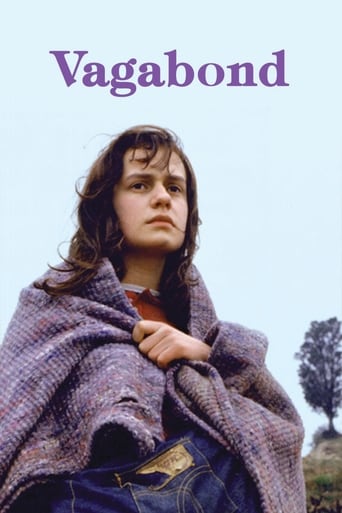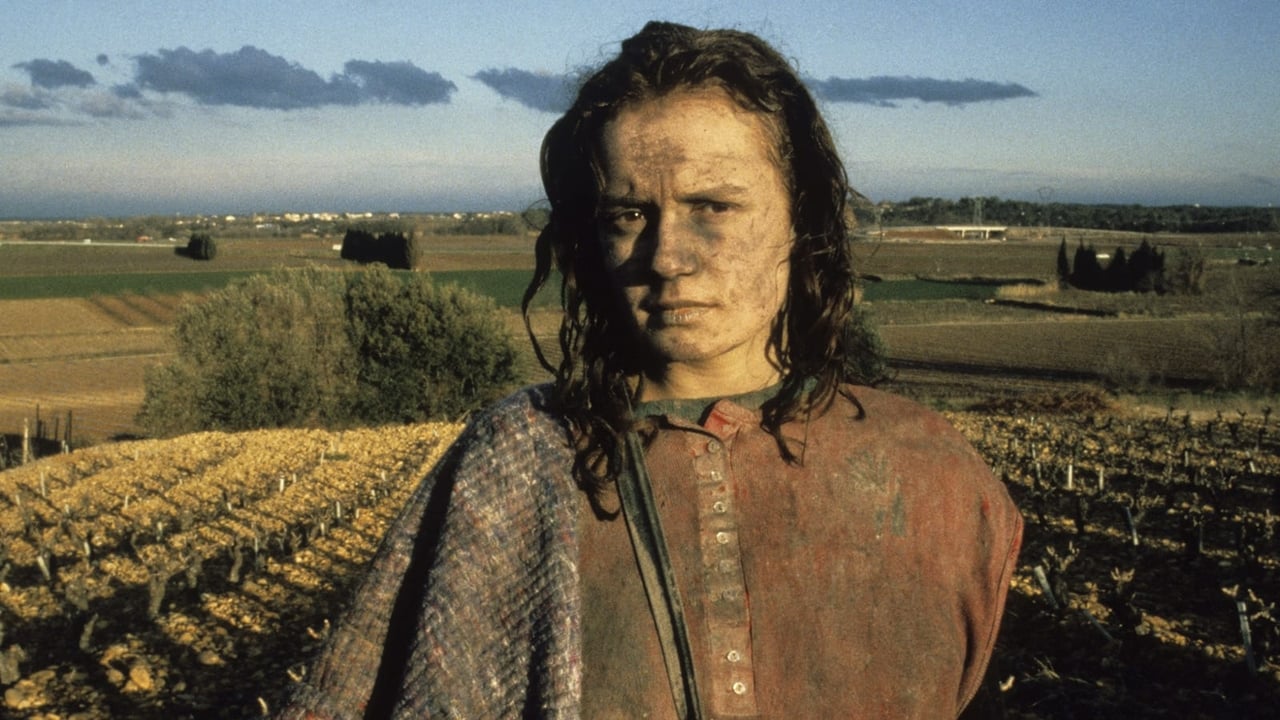MartinHafer
I've seen several films by Agnès Varda and this one is pretty much what I expected...unfortunately. While Varda is loved by some, her films have a very non-cinematic quality. That makes her work very much the stuff artsy folk often like but which have no broad appeal. To many of her fans, she is a genius with her documentary and documentary style films. As for me, her work just doesn't do much for me. This isn't necessarily a criticism...just the truth that these style films just don't excite me in any way...possibly because he subject matter is often so mundane.When "Vagabond" begins, a young lady is found dead in a trench...dead, apparently, from exposure. The film then backtracks a few days and shows this woman's life up to her untimely death. Mona is what folks used to call a hobo...a person without a home who likes the life of the open road. She'll work when she has to...but only enough to get her a bit to eat, some alcohol, some cigarettes or some drugs. But for the most part she enjoys a subsistence life- -one with no real connections. The film shows her many interactions with others and some of the folks she met are interviewed. It's all fiction but done in a way that appears to be a documentary. Is there any real point to all this? I dunno...but I assume Varda's point is that there is no point...a sad look into a sad life. I was assuming I'd develop a connection...a sense of caring about this dead woman...but this was not to be. Instead, it's an oddly detached film.If this sounds like a depressing film, then you pretty much get the drift of the movie. It's unpleasant and mildly interesting. If you look at the reviews, most folks seem to love her work but I also suspect these are Varda-philes. As for me, I adore French films but not this type. I would have much preferred a more fake, glossy and cinematic project...perhaps one like Varda's deceased husband, Jacques Demy, would have made.
chaos-rampant
A large group of films I'm drawn to are about suffering, in Buddhism one of the three marks, on the tacit assumption that we'll have a view about what's on the other side, transcendence. Most films deal with it but few do it well, with insight of the mechanisms that sustain it.So this is the paradigm that Varda evolved through her career, or one of them, looking into the possibility of a meaningful life that deals with suffering, and the things that obstruct it. A vagrant girl here is discovered dead one morning in a ditch, the film follows the last few days in her life. This is for us to see someone who suffers, understand something of what drives that suffering.The French countryside here is a far cry from the idyllic reverie of Le Bonheur, this one is full of joyless provincial roads with unadorned concrete strewn about. In the same beat it mirrors the young girl; instead of a swanlike innocence crying out to be saved, we see a tomboy with a cold shell that bellies anger, hard to like, erratic, unwilling to be taken in.The more eloquent French title meaning "without you and law" points to these two kinds of absence. A world left to seed and grow callous, with a lot of law perhaps but little that takes care of life. And a life we live in that world that we are responsible for, that forgets to be mindful of itself and lets itself slip through the fingers, the girl's withering no less her own fault. It is for us to see both these things in effect. No need for backstory because what gives rise to a broken life is exactly what we see in the girl and those around her, indifference and selfishness, it's all woven right in.As it goes on however it seems to point at no way through and only charts the landscape. We don't get to see if these obstructions that move behind the self are permanent or impermanent, are we saddled with them for life or are they subject to change?But Varda has reserved a stunning scene for the end as actual in- sight of this tormented soul tossed about by things she can't understand in a maddening world - the girl eventually stumbles about in a daze through the streets of a village where some local carnival is taking place, suddenly finds herself chased and terrified by masked figures covered in blood.It's all here in this scene, the frightening apparitions that she can't understand, the swirl of confusion and fear but the appearances are not what her mind thinks they are, the figures are play-acting, the blood (that someone is seen washing near the start) is not real. This is an ultimate view of the reality of obstructions, they are illusory in just this way, empty. We can rest here.
kenjha
The last couple of weeks in the life of a dead vagabond woman is told in flashbacks. Like the vagabond, the film wanders aimlessly and rather pointlessly. Mona, the lazy, sullen, and drug-addicted title character, is not likable and Bonnaire does little to make her interesting. Although there is some pretentious dialog attempting to explain why Mona has chosen this miserable lifestyle, her motivations are never really clear. The episodic nature of the film, involving some random characters, becomes tiresome after a while, making it seem much longer than its running time. It is also hard to believe that an attractive young homeless woman would not draw more attention from men.
ThurstonHunger
With an antagonizing protagonist who is as doomed as the plane trees in the film...this film could be seen as strictly nihilistic. I recently watched "SherryBaby" and strongly preferred this film which I watched a week prior, and yet I still find myself pondering Sandrine Bonnaire's portrayal of a woman who is stranded.Indeed "No one makes it alone" could better be the tag line here, and Bonnaire's Mona goes on an odyssey that is nothing short of harrowing. Also trading heroin chic for (self-imposed?) homeless bleak pushed us into less charted filmic waters. Choosing an unknown for the title role was also a good call I suspect. The film is now older than it's lead actress was at the time.So much of the film talks about how Mona stinks, perhaps smell-a-vision would have helped ;> Honestly her face is still too attractive, although wide and maybe manly in a way, that for me the sense of her scent didn't wash. That being said, her disaffection was on display so well, that you could see her as having a dirty soul. At nearly every chance of being likable she veers to the other direction, the one notable exception for me being her interaction with the "platonologne" (is that like octogenarian, don't know the French...the characters all had interesting descriptions in the credits)..Additionally, from the English subtitles and snatches of French, I sense the dialog (should I say dialogue) in this was quite cutting and clever in parts.While Mona lives without roof or law, while she may move without purpose or direction, she is more than a human tumbleweed. She does not live without leaving a trace...but the filmmaker keeps us intentionally distant from her, we are never allowed inside her mental tent. Thus our composite sketch of her is as complex and contradictory as the people she encounters. Not only does Mona live without control over her life, her death as well eludes her.Viewers may find it less easy to escape.Thurston Hunger 7/10


 AD
AD




